US Seeking 15% Minimum Tax on Corporate Giants Under Inflation Reduction Act

Overview of the Proposed 15% Minimum Tax
The US Treasury Department has proposed a 15% minimum tax on the largest, most profitable corporations. This move is part of the Inflation Reduction Act (IRA) aimed at ensuring corporate fairness in taxation.
Key Details of the Plan
- The corporate alternative minimum tax (CAMT) targets companies making substantial profits.
- It is projected to significantly raise federal revenues by taxing big corporations more effectively.
- Many firms currently benefit from loopholes that allow them to avoid paying taxes.
Implications for the Corporate Sector
Implementing this tax could lead to major changes in how companies approach their finances, potentially influencing investment strategies and profit margins. Investors should pay close attention to legislative developments and how they might impact market behavior.
Potential Market Reactions
- Companies might reassess their tax strategies.
- Increased compliance costs could arise.
- The move may boost public sentiment towards corporate responsibility.
This article was prepared using information from open sources in accordance with the principles of Ethical Policy. The editorial team is not responsible for absolute accuracy, as it relies on data from the sources referenced.